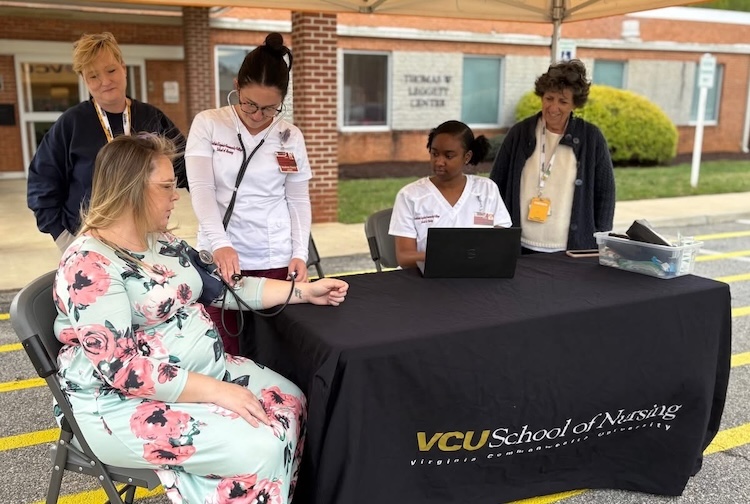Radiation Safety Officer Helps Keep Patients Safe at VCU Health Community Memorial Hospital
March 02, 2021
Caption: Dr. Albert Mungo operates a fluoroscopic imaging system which uses X-rays to provide real-time moving images of the inside of the body.
Radiation safety is so important in health care settings. Patients trust their health care provider to only use radiation when absolutely necessary and use protective measures to keep them from potential harmful effects. VCU Health Community Memorial Hospital (VCU Health CMH) is required to have a Radiation Safety Officer (RSO) whose job is to focus on keeping patients and staff safe. Their previous RSO retired so Albert Mungo, MD, took on that role.
Dr. Mungo's experience as a radiologist makes him the ideal man for the job. He started his health care career in the lab. After staying late to help a nephrologist having an emergency, that physician noticed his initiative and became his mentor, encouraging him to pursue his passion for helping others. Once completing his medical education in Illinois, he finished his medical training in Michigan. Dr. Mungo worked as a radiologist who fills in for other physicians while they are on leave in Halifax, Richlands and Kilmarnock. When this opportunity became available at VCU Health CMH, he accepted the full-time position.
Dr. Mungo not only takes images inside the body, but he is a photographer as well. In medical school he converted a bathroom without a window into a dark room to process his own film. These days he dabbles in digital photography when he can, but he prefers to spend time woodworking and playing golf. His primary home is in Halifax, where he transformed an outdoor shed into a woodworking shop to make furniture. He also has a residence locally in South Hill to be at the hospital within a moment's notice.
The RSO's main focus is to ensure the safe use of radiation. Dr. Mungo accomplishes this by identifying safety problems and correcting them, stopping unsafe activities and making sure everyone is following regulatory requirements.
“We exhaust all non-radiation imaging procedures like ultrasounds first, and then only use imaging procedures with a minimal amount of dose while looking at what is more beneficial for the patient. The goal is to have all patients and employees at minimal risk,” Dr. Mungo explained.
Most of the work is completed by the technologists but Dr. Mungo oversees the handling, transportation and disposal of radioactive materials and leads daily, quarterly and annual quality control protocols. A physicist makes sure all equipment is up to date.
VCU Health CMH uses protective equipment like lead aprons, lead vests, lead glasses and lead-plated walls. Safe practices include distance from the radiation source, and procedures that can be performed from another area. Despite these measures, some amount of radiation exposure can inevitably get through. VCU Health CMH monitors employees' radiation levels with dosimeters, which are worn every day on the job. “If we have pregnant employees, we keep them away from radiology procedures as much as possible, but they do wear a second dosimeter for the fetus,” Dr. Mungo said.
In addition, the Imaging Department of VCU Health CMH is accredited by the American College of Radiology, which means it provides the highest level of image quality and safety by documenting that this facility meets federal requirements for equipment, medical personnel and quality assurance.
Furthermore, VCU Health CMH technologists are registered with the American Registry of Radiologic Technologists and are also registered and certified in specialty areas such as Mammography, Magnetic Resonance, Ultrasound, Nuclear Medicine and Computed Tomography. They adhere to and support the Image Wisely and Image Gently initiative guidelines with the objective of lowering the amount of radiation used in medically necessary imaging studies and eliminating unnecessary procedures.

Dr. Mungo wears a lead apron, lead vest, lead glasses and dosimeter while standing behind a lead-plated wall for protection.

VCU Health CMH monitors employees' radiation levels with dosimeters, which are worn every day on the job.











